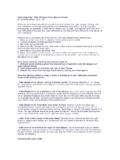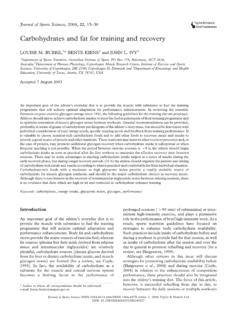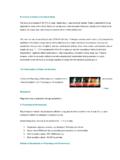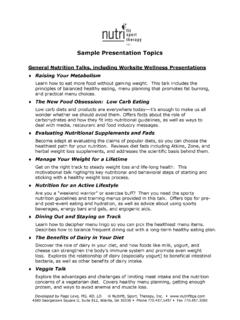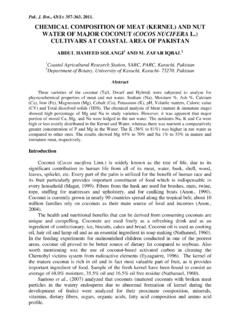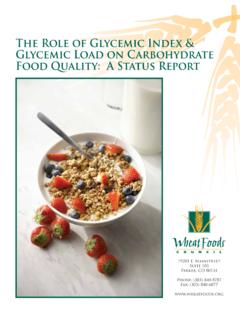Transcription of Nutrition Guide for Coaches - Special Olympics …
1 Many factors contribute to the Special Olympics Team and individual athlete s success in sports performance. Athlete training, commitment, capabilities and injury avoidance all contribute to the individual athlete s success. The athlete s diet affects their performance, the foods they choose during training and event competition will impact their sports performance. Food gives the body the energy to walk, run, and play sports. Good Nutrition is important for the athlete s everyday health. Eating a healthy diet will give energy to the body and allows it to be active in daily life. A healthy diet also keeps the athlete focused while practicing or competing in an event, whether basketball, track, or soccer. Practicing good Nutrition can help the athlete improve in the sport! As a Special Olympics Coach you are responsible to ensure a safe environment for athletes . Promoting a healthy diet for your athletes is an important responsibility.
2 Hydration Keeping Fluids in the Body Adequate hydration and fluid replacement is one of the most important nutritional concerns or an athlete. Ensuring that all athletes are adequately hydrated is a critical responsibility for the coach. Ensuring that all athletes are adequately hydrated is a critical responsibility for the coach. As the athlete trains and competes, fluid is lost through the skin through sweat and the lungs while breathing. If the lost fluid is not replaced during this time, it can lead to dehydration. Dehydration is entirely preventable. The coach should plan for adequate hydration of all athletes , regardless of age or gender. Dehydration means the athlete has a decreased volume of blood circulating through the body, and results in: A decrease in the amount of blood pumped with each heart beat Exercising muscles do not receive enough oxygen Exhaustion sets in and the athlete s performance suffers Nutrition Guide for Coaches When to Drink Water How Much Water to Drink Night before practice or competition Glass of water (8 ) Four hours before event Glass of water (8 ) 15 minutes before event One-half glass of water (4 ml) During event of less than one hour One water break During event of more than one hour One-half glass of water (4 ml) After event Glass of water every three hours until next day athletes need to be instructed to drink as much water as they want.
3 If you are practicing in warm environments, you may need to increase the frequency of water breaks. Carbohydrate fluid replacement drinks (PowerAde, Gatorade) - should not be used frequently, they contain excess calories can contribute to unnecessary weight gain and dental caries. If used, they are more appropriate for the more intense sports such as cycling and track and field. Energy drinks & soda are NOT recommended; they contain stimulants (such as caffeine) and could impact the athlete s health. In addition some medications the athletes take can be impacted by excessive caffeine. Nutrition Overview Carbohydrates, protein and fat are the three main nutrients in food that keep the body functioning every day. 1. Carbohydrates: Fuels the muscles and allow them to work for longer periods of time without getting tired. Sources of carbohydrates include whole grains, fruits, and vegetables.
4 2. Proteins: Builds and repairs muscles and body tissue. athletes who participate in strength and endurance sports may have higher protein needs than athletes participating in other sports. Most athletes can meet their protein requirements through a healthy diet. Sources of protein include eggs, meat, fish, beans and legumes (pulses). 3. Fats: Provides energy, helps the body absorb vitamins. Small amounts of fat in the diet are necessary. Sources of fat include butter, oils salad dressing, mayonnaise, whole milk and yogurt and desserts. Vitamins and minerals do not provide energy, but are needed in very small amounts to enable the body to perform efficiently and effectively The athlete should eat a variety of foods from each food group will help the body get all the vitamins and minerals, it needs to function. Keep the athlete s plate balanced between the food groups- this helps to ensure the athlete is meeting all Nutrition recommendations.
5 It is important to include at least three different food groups in each meal. Eating different foods allows the body to receive all the nutrients it needs. A good Guide to use when eating is dividing a plate into three sections. Fruits and vegetables should take up one-half of the plate. Grains make up of the plate and meats, fish, eggs, legumes and beans (pulses) make up another of the plate. Dairy foods are shown as a circle in the middle of the plate. Dairy foods can be added to other food groups in meals or taken as a beverage. Healthy oils and fats like olive oil can be added as a salad dressing. *oils are only needed in small amounts and are often added during cooking. Nutrition Guide for Coaches Nutrition and Sport Eating well on a regular basis will keep the body healthy and in top shape for participating in sports. To fuel the body for each workout the athlete has to focus on what he or she is eating at three specific times: before, during and after exercising.
6 This will help the body build up the energy it needs to perform the workout, keep the energy while working out, and recover from the workout. Nutrition Guide for Coaches Before an event During the event After an event Day before the event The night before get a healthy dinner to start building energy, focus on eat-ing grains, lean meats, fruits, and veg-etables to get plenty of carbohy-drates. Drink water to be ready for the next day. Day of the event 3 or 4 hours before the event eat a meal which includes a serving from each food group and drink water. Avoid foods high in fat, these can take a long time to digest and make you feel tired If there is an event or practice early in the morning the athlete may not have time to eat a full meal before-hand. In that situation they should eat a good meal the night before and in the morning of the event, eat a small meal or snack an hour before it begins.
7 1 hour before the event, eat a small snack (like a cereal bar or piece of fruit) and drink water Food for Events or practices shorter than 60 minutes, it is not necessary to eat to maintain energy. Events or practices longer than 60 minutes, the athlete should eat small amount for energy. Any event- fruits, granola and cereal bars, can give a boost of energy during workout or sport event. Water should be consumed: Every 15 minutes, and at breaks while exercising. At high intensity sports or events/ practices longer than 60 minutes. Could consider a sports drink during high intensity sports. Snack 15- 30 minutes after: Eat a small snack to begin to regain the energy. Meal One to two hours after: Eat a meal with all the food groups. Give the body back all the energy it lost by eating a healthy meal which includes a serving from each food group.



